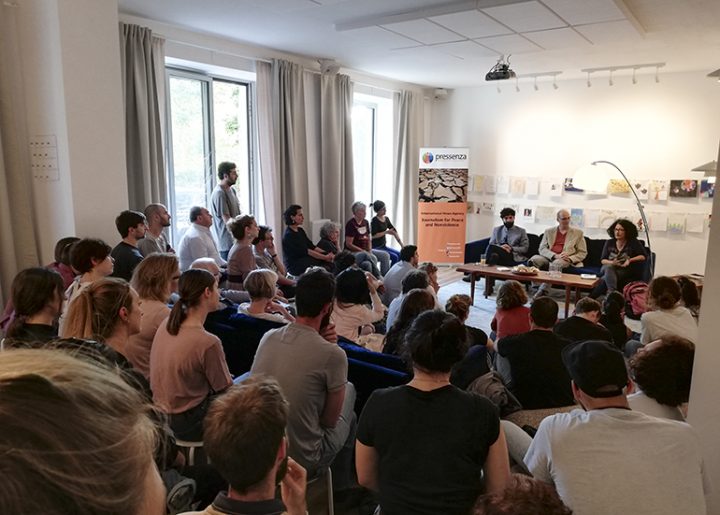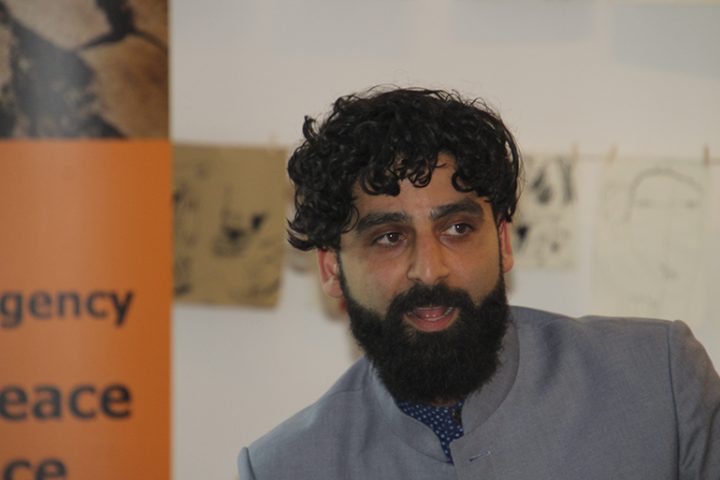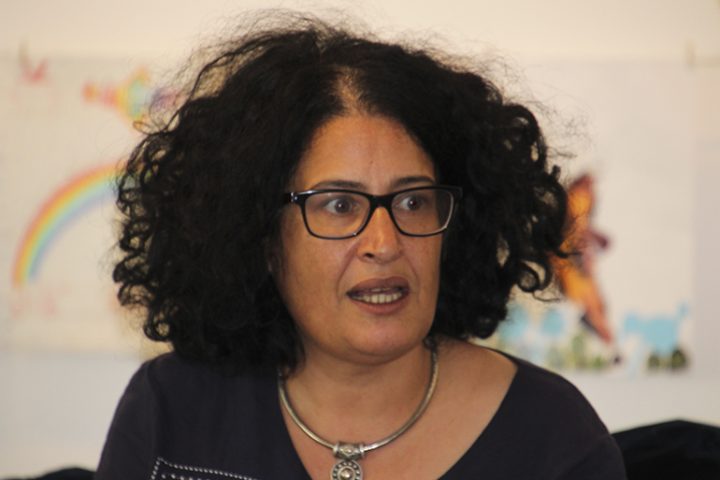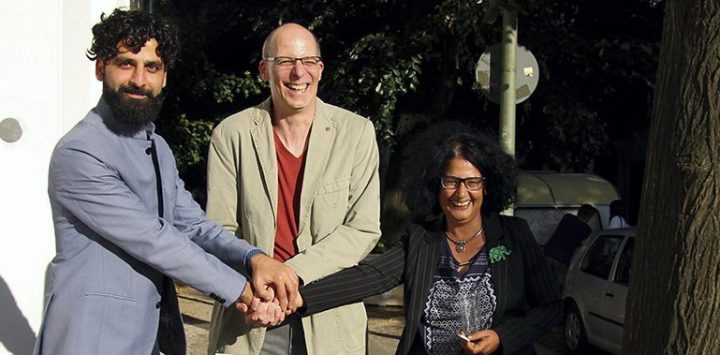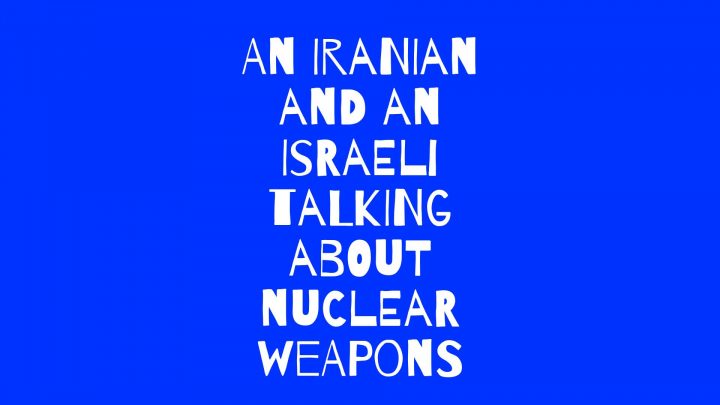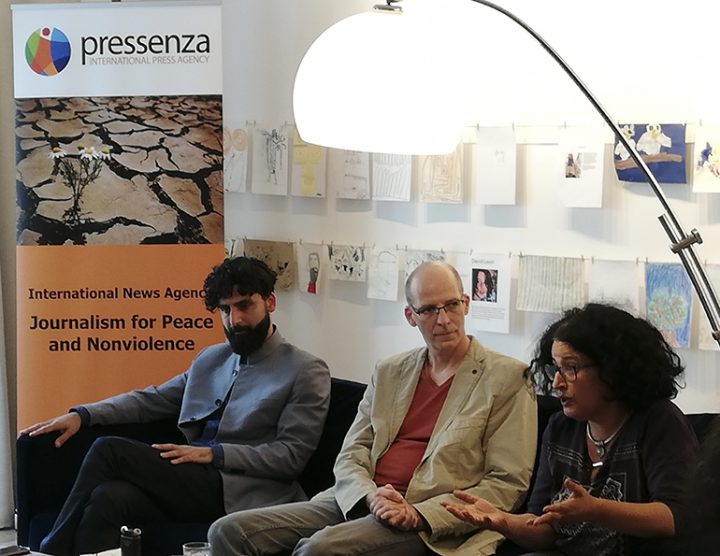This unremarkable title for an evening event last Wednesday at the Framed.berlin cultural centre did, in fact, draw attention.
Discussion events are not necessarily a big crowd-puller nowadays and most people prefer to look away rather than listen when it comes to nuclear weapons. Nevertheless, about 80 people came to the event, which had only been published shortly ahead of time.
Is it really so unusual for an Iranian and an Israeli to talk to each other? Or has the increasing tension between the USA and Iran in the nuclear conflict sparked interest?
Yes, the tensions are high again in the region and there are a lot of conversations about the Middle East. These talks usually involve white, middle-aged men. As so often happens, the people who are most affected are not involved in the discourse. Furthermore, women rarely get to speak even though they have a leading role when it comes to taking actions to protect human life. And so, unfortunately one could almost say that this evening was something very special.
Regardless of gender and origin, the two personalities, Sharon Dolev and Emad Kiyaei and the way they spoke to the audience, made a strong impression. Both founding members of the Middle East Treaty Organization (METO) Project are committed to a zone free of weapons of mass destruction in the Middle East and are obviously linked by a deep friendship. They took the audience through a highly complex topic competently, eloquently, movingly and also with humor, which prevented feelings of resignation or hopelessness from arising in this very serious issue.
In the Nuclear Non-Proliferation Treaty (NPT) of 1970, the majority of the 187 signatory states gave up any intention to acquire their own nuclear weapons while the then five nuclear powers were allowed to keep them, but under the condition that they negotiate nuclear disarmament in good faith and, added in 1995, create a nuclear-weapon-free zone in the Middle East. The latter has never been fulfilled.
How does this initiative even dare to propose a treaty to give up nuclear weapons in a region where the various heads of state do not even want to sit down at the same table? As great as the skepticism at the beginning was, extending the call to ban all weapons of mass destruction brings such a zone into the realm of the possible.
Sharon said that one could literally hear the click in the head, since a ban on all weapons of mass destruction was a common security interest and such a ban would “hurt” all sides. Despite the skepticism, the METO Project has managed to get different sides to cooperate on a Draft Treaty and thus keep a negotiation process going. Of course, the unilateral termination of the Iran nuclear deal by the USA and the resulting danger of war are making such an agreement a far cry from the future. On this point, Sharon Dolev formulated an appeal to the EU and especially to Germany, which plays a key role, to act according their responsibility and instead of always talking “about” the Middle East, seek direct dialogue “with” the states in the region.
Emad explained the significance of the so-called ‘Iran Nuclear Deal’. A key part of the NPT is that states that had tested nuclear weapons before 1968 could keep them in exchange for the rest of the world having the right to peaceful applications of nuclear technology. There are many such applications in agriculture and pharmaceutical products, and of course for energy. Iran wasn’t allowed to buy enriched uranium due to the sanctions and therefore started its own enrichment program. The Iran Nuclear Deal ensures that the nuclear program remains peaceful. It is not a perfect deal and there are still some loopholes, but it does close most of the doors to nuclear weapons that exist in other international treaties. The Iran Deal is a blueprint for how to make sure that any country suspected of having nuclear weapon aspirations doesn’t get them. Of course nuclear energy is a disaster for the planet, as anyone who has seen the recent HBO Chernobyl docu-drama will understand, but while the NPT enshrines the right to it, Iran is doing no wrong with its enirchment program.
The audience at the event consisted, in large part, of members of the Israeli and Iranian community living in Berlin and there was a lively but also respectful participation in the Q&A session. There were no provocations. On the contrary, one could feel the great common concern for the security of the entire population in the region and the strong desire to be able to take action.
The content of those two intense hours cannot be summarized in this article, but the conclusion of the evening was that the world and not only the region needs a peace policy instead of economic boycotts and sabre-rattling. Bridges and confidence must be built and dialogue created. Peace needs guarantees and stability, the destabilization of entire regions inevitably leads to war. Peace in the Middle East and a nuclear-free world begin with a paradigm shift in our minds. Every important change in history has taken place bottom-up, even if the history books tell a different story. It is up to us to set these processes in motion and this evening was certainly a small step in that direction.
Images from Maga Navarette, Pressenza:
